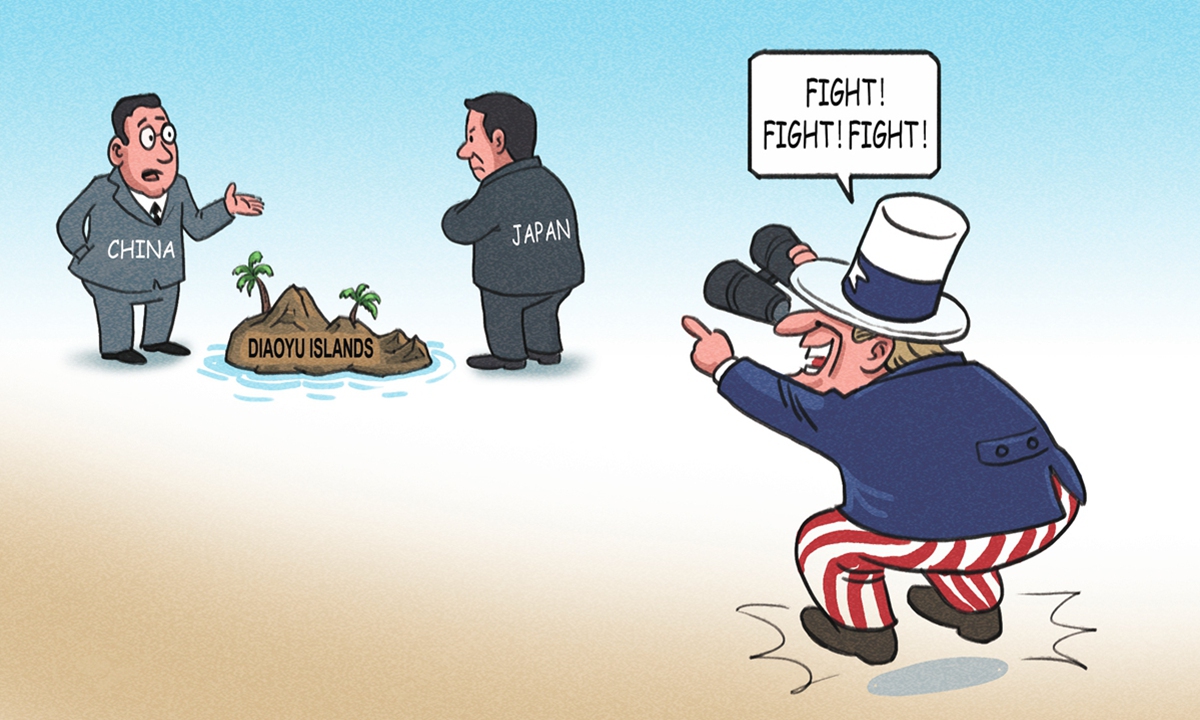China, Japan should avoid new animosity: Global Times editorial
Source: Global Times Published: 2020/7/30 21:11:26

Illustration: Liu Rui/GT
British media reported that the Five Eyes intelligence alliance could be expanded to include Japan and become the "Six Eyes alliance," and be broadened into a strategic economic relationship, according to some British center-right members of parliament. Japanese Defense Minister Taro Kono has said Japan would welcome an invitation to join the Five Eyes alliance.
The Five Eyes alliance is composed of five English-speaking countries outside of Eurasia, including the US, the UK, Canada, Australia and New Zealand. Previously, it was mainly an intelligence alliance. Recently, as China-US relations have deteriorated sharply, the four countries are following Washington more closely than other Western countries. The alliance has emerged as the primary geopolitical tool of the US' China strategy. The US finds it difficult to mobilize NATO and other organizations to deal with China, and thus it relies more on the Five Eyes alliance.
Now, the alliance is flirting with Tokyo. If Japan joins the alliance, they will not make much progress in intelligence sharing because Japan and the US already have close intelligence exchange, but it will have clear geopolitical influence. This will add new meaning to the Japan-US alliance, making Japan more like an outpost of the alliance against China.
Is this the message that Tokyo wants to send Beijing? We hope Japan thinks twice before it acts.
The alliance did not accept typical Western countries like Germany, France and Italy. Why is it interested in including Japan? Could it be anything other than a huge strategic plot?
China and Japan have a long history of friendly exchanges. In modern times, Japan continuously invaded China, until it paid a heavy price in WWII. Most of the problems between China and Japan today have been historical issues. China and Japan are generally in the process of resolving and controlling those issues, which still takes some time. However, China and Japan need to increase reciprocal cooperation to complete this transition, and avoid adding new disputes.
China has generally regained its status as the most powerful country in Asia, and it is normal that Japan has its concerns. But China is more powerful than Japan, and this is a return of the normal state between the two countries. The two sides need to find a way that is beneficial, or at least harmless, to get along with each other.
Japan and the US are allies for historical reasons. Against this backdrop, it is understandable that Japan uses US power to achieve a certain balance against China. But Japan needs to be very cautious. In the era of China-US strategic competition, Japan should not side with the US and help the US bring China down. That would affect China's fundamental interests, and Japan would be generating new animosity between Japan and China.
The issue of the Diaoyu Islands is a typical historical issue. It is a subtle issue of how important the Diaoyu Islands, a group of uninhabited islands, are to China and Japan's national interests. It is currently more an issue of sovereign dignity. The Diaoyu Islands dispute was once put aside in China-Japan diplomacy, which was a wise move. It turned into what it is today after a series of complex interactions. It is difficult for both sides to retreat. Neither China nor Japan should intensify the dispute toward a strategic level. The two sides should avoid collisions on declaring their sovereignty of the Diaoyu Islands, and leave room for each other's self-esteem. Japan should not be opportunistic on the Diaoyu Islands dispute, exaggerate the true significance of the dispute, or use it for strategic mobilization.
If Japan joins the Five Eyes alliance, jumps out of the framework of the China-Japan relations, and becomes the Asia-Pacific vanguard of the US' so-called new cold war against China, then it would be the first country to do so among China's neighboring countries. The Chinese people will never allow Japan to do this. Compared with issues such as Japanese officials visiting the Yasukuni Shrine, the Diaoyu Islands disputes, Japanese history textbook disputes, Japan joining Five Eyes will be a much more serious problem. It will create deep new hostility between Chinese and Japanese societies.
We urge Japanese policymakers to look at the bigger picture. We hope China and Japan can show wisdom and contribute to a long-term stable bilateral relationship for the two peoples. China and Japan are close neighbors, and gradually resolving their historical disputes is in line with the two sides' long-term interests.
Posted in: EDITORIAL